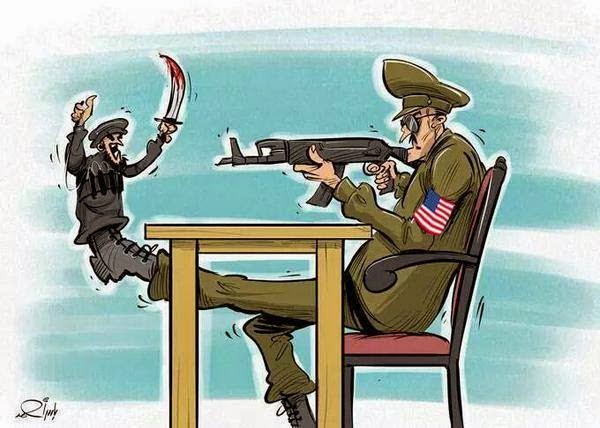
Although America, based on the supposition of many scholars of political science and international studies, cherishes the biggest claim all over the world against terrorism, the footprints of American spy services and their accomplices could be obviously detected in many terrorist attacks and acts of violence in the globe.
More often, the policy of fighting terrorism became part of the American State’s tasks after the Cold War or the solution of the problem of the bipolar world so that U.S. could replace Communism and its center, that is, the Soviet Union with an invisible terrorist; thus the U.S. could justify the development of military munitions and weaponry cartels and lead the whole world to this conclusion that “the United States should take the lead of the world as it has the first voice against terrorism and violence”. The benefits of such a claim are so clear that they need not be mentioned.
Although American politicians most shamelessly and frankly call America’s direct interferences in other countries and continents as “The US interests”, the following two questions have remained and will remain unanswered:
1. What "interests" can America reap in the other continents of the world, millions of miles away and among the other peoples’ national wealth?
2. Who are actually in charge of these clashes and terrorist acts that pave the way for the military interference of America and its European confederates?
There is, of course, no need to look for answers to these questions. Besides, it will not be difficult to understand why most of the wars, clashes, and military intrusions occur on strategic oil-rich regions. The issue of ISIS and other Takfiri groups of the world are of the same category. America and Saudi Arabia’s intelligence services have played the same game for about two and a half decade in the Middle East and now its flames have reached other continents, or better to say, wherever America’s interests lie.
Al-Qaeda terrorist group is a combination of Wahhabi and Muslim Brotherhood in Egypt. Their financial and intelligence support is sort of a deal between Arab countries, especially Saudi Arabia, and Western States, America, in particular – such a deal that serves multiple objectives for the initiators of these groups. Spending on these groups helps changes desired by the supporting States be done. Meanwhile, increasing conflicts and terrorist acts makes it easier for military invasions followed by political interferences. The cases of Afghanistan and Iraq are good samples. Not only did the issue of terrorism, which was the main pretext of the war, remain unresolved after America and its coordinators’ invasion, but it also gave rise to a new problem in the area.
Nowadays, there is a global consensus over the terrorist nature of ISIS and as usual there exist indications and evidences on the relationships of Al-baghdadi, the head of the group, with Israel and US after his release from American jails. Now, one should see what advantages ISIS has had for the American State.
The Iraqi branch of Al-Qaeda, the same ISIL which has delinked itself from Al-Qaeda, could extend and justify America’s military stay in Iraq for another eight years through its terrorist acts in Iraq’s important cities in recent years. On the other hand, the presence of this group in Iraq has kept open the doors of violence and terror and the re-appearance of Americans and the other Westerners on Iraqi land for imposing political dictates and direct interference in Iraq’s internal politics. In recent years and after the acts of rebel groups in Syria against Bashar Asad’s government, this group has played a major role in the policy of eliminating Bashar from the political scenery, but all in vain. The last action seen to have been taken by this group has been occupying Mosul and parts of the northern provinces of Iraq after the coalition of the Law State led by Nouri Maleki won the election. This action has been important and of value for the supporters of ISIS on three bases:
1. Igniting tribal-religious clashes and putting in a mess Iraq’s important oil fields so that Maliki State was forced to seek help from foreign states especially America and this meant new intercessions. Concurrent to Maliki’s ask for help, there rose voices in America’s Congress against Maliki, seeking his elimination from Iraq’s political scene.
2. Increasing the possibility of the fall of Maliki State or Iraq’s present government and the West’s dominating key posts in Iraq through West-supported political agents.
3. Taking serious the possibility of dividing Iraq into three countries led by Kurds in the north, Sunnis in the center, and Shiites in the south.
Some other indirect objectives could, of course, be detected to have been followed by ISIS, representing the West in Iraq, such as convincing Afghanistan State to sign the security pact with America after having seen Iraq’s disarray and breaking the line of struggle in the region and thereby helping the fall of Syria State and Hamas Struggle.
In general, the presence of a terrorist group anywhere in the globe gives its supporters the opportunity for planning, applying policies, and innovating alternative plans and replacement for the failed plans. For instance, the U.S. government has spent more than $2 trillion in Iraq war but eventually the policy of empowering the America-sponsored government in Iraq failed due to the general discord on the dominance of America over Iraqi State. At this stage, the presence of Al-Qaeda, bearing the local name of Islamic State of Iraq, could be used as a means for applying America’s later plans for the fall of the present government and the rise of the next one.
Now, one can find an answer to this question more easily: what is the reason for the survival of groups like MEK under the protection of America and Europe? What do alternate supports and condemnations of this group mean?
